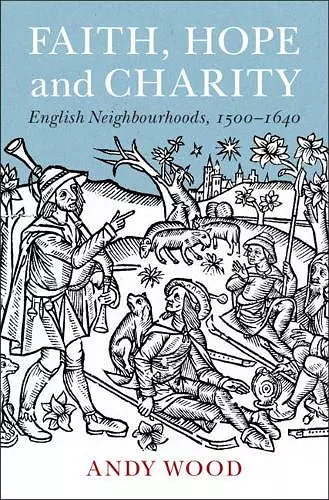Faith, Hope and Charity
English Neighbourhoods, 1500–1640
Format:Paperback
Publisher:Cambridge University Press
Published:22nd Oct '20
Should be back in stock very soon
This paperback is available in another edition too:
- Hardback£75.00(9781108840668)

Explores the hidden lives of neighbourhoods in early modern England - their communal ideals, social practices, notions of gender, locality and belonging.
A study of English neighbourhoods based on a rich variety of hitherto largely unstudied sources, engages with the interaction of social ideals and everyday experience in Tudor and early Stuart neighbourhoods with emphasis on popular religion, notions of gender, locality and belonging between 1500 and 1640.Faith, Hope and Charity explores the interaction between social ideals and everyday experiences in Tudor and early Stuart neighbourhoods, drawing on a remarkably rich variety of hitherto largely unstudied sources. Focusing on local sites, where ordinary people lived their lives, Andy Wood deals with popular religion, gender relations, senses of locality and belonging, festivity, work, play, witchcraft, gossip, and reactions to dearth and disease. He thus brings a new clarity to understandings of the texture of communal relations in the historical past and highlights the particular characteristics of structural processes of inclusion and exclusion in the construction and experience of communities in early modern England. This engaging social history vividly captures what life would have been like in these communities, arguing that, even while early modern people were sure that the values of neighbourhood were dying, they continued to evoke and reassert those values.
'A profound and impassioned account of what it meant to be a neighbour in an age of societal transformation. By reappraising the relationship between the idea and experience of neighbourliness, often viewed in terms of conflict or decline, Wood demonstrates vividly how perennial bonds between working people were emotionally rewarding as well as economically functional.' Malcolm Gaskill, University of East Anglia
'An extraordinary archival exploration into what early modern people thought and said about belonging and exclusion. Andy Wood gives voice to those who experienced the values of faith, hope and charity most sharply, through the ongoing tensions between collectivity and exclusion, in the streets and villages of early modern England; this book shows how neighbourhood was both an abstract ideal and a mode of emotional and social engagement, gendered power and social interaction.' Laura Gowing, Kings College London
'A deeply empathetic exploration of how the ideal of neighbourhood continued to be used to hold early modern communities together in the face of new challenges like Puritanism, and old such as hunger and disease. It is, as Wood states, a celebration of 'voices in the archive' as they expressed the need for togetherness.' Craig Muldrew, University of Cambridge
'… engrossing … Wood's book … feels freshly relevant in showing how the values of neighbourhood were co-opted by the state … [it also testifies] movingly to the ability of ordinary people to sustain themselves, and their neighbours, even in the worst of times.' Arnold Hunt, Times Literary Supplement
'His archival terrain is bountiful. Drawing on a remarkable range of materials (from ballads, plays, court records, parish records, and a wide array of social commentary in print and manuscript) Wood provides a richly textured account of the ways in which principles of common humanity could produce and consolidate bonds across various divides shaped by belief, gender, and locality as well as social politics.' Alexandra Shepard, Family & Community History
ISBN: 9781108814454
Dimensions: 228mm x 152mm x 17mm
Weight: 440g
306 pages